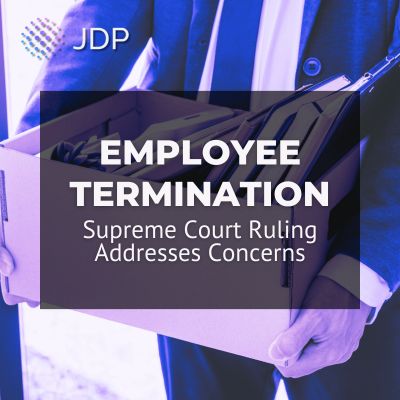August 14, 2024
The United States Supreme Court recently made a ruling that could help companies terminate employees for violating company policies. This ruling could ease the concerns of employees accusing the companies of unfair labor practices during the termination process. It will prove especially helpful when addressing unfair labor practice allegations and union-organizer workers.
However, the case has not received a final ruling. Instead, the Supreme Court recently returned the case to the lower court. The lower court also received instructions to apply the appropriate standard for Section 10(J) injunctions. The returned case concerns seven employees of a major coffeehouse chain.
According to an attorney with Akerman in Chicago, many CEOs, HR executives, and managers hesitate to terminate employees involved in union-organizing drives. Since this ruling, others have spoken about the potential outcome and its reassurances to employers. For example, the Society for Human Resource Management (SHRM) chief of staff said, “The Supreme Court’s ruling is a step towards leveling the playing field, offering a clearer framework for businesses and employees alike.”
According to the plaintiffs, the company terminated them for engaging in union-organizing efforts at their store in Tennessee. The coffee company denied this allegation, arguing that the terminations happened due to company policy violations. One example described how the employees entered the store after closing hours and allowed unauthorized people inside.
The Supreme Court vacated previous rulings that claimed the coffee company had unlawfully fired the plaintiffs. According to the Supreme Court’s ruling, the National Labor Relations Board (NLRB) must satisfy the traditional four-part test to issue a Section 10(J). The case revealed that the NLRB initially used a two-factor test.
This decision could help businesses terminate employees who violate company policies, including those involved in union-organizing activities. However, companies must ensure they enforce their policies consistently. The NLRB stressed that it would carefully review every termination case involving union organizing. It is also essential for businesses to document how they maintain consistency with the company policies. However, employers must understand that the NLRB could determine that the policies are illegal.
Companies cannot interfere with their employees’ right to organize, question them about union activity, or offer benefits to discourage support for a union. Employers must also avoid threats of repercussions for union activity and cannot monitor the activity. Failure to adhere to these requirements opens employers up to unfair labor practice suits and can lead to the NLRB ordering them to stop illegal practices.
The NLRB may require employers to provide remedies to affected employees. Examples of restitution included reinstatement and back pay.
